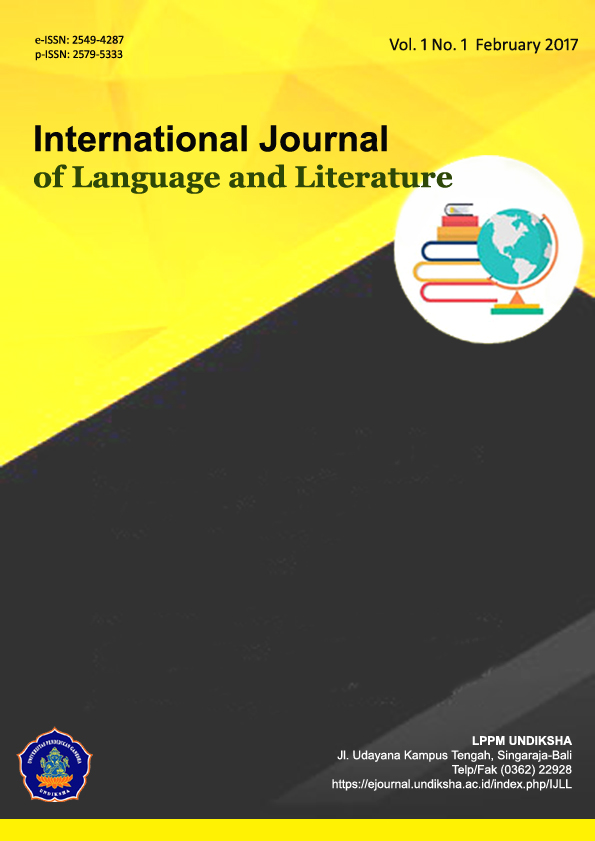Character Education Values on Alice's Characterization in The Alice's Adventures in Wonderland by Lewis Carroll
DOI:
https://doi.org/10.23887/ijll.v5i4.31863Kata Kunci:
character education, characterization, children’s literatureAbstrak
Education is an essential need for human character building. Education also can be one of the methods used to maintain the cultural heritage and national character of the young generation. However, the quality of education is needs to be considered in develop good nation. If the education is lack of quality, it makes negative affect for future generations, such as the emergence of the phenomenon of character degradation. This study aimed to identify character education values on Alice’s characterization in the children’s literature entitled Alice’s Adventures in Wonderland (1865) by Lewis Carroll. The values of character education in this study formulated by the Ministry of Education and Culture of Indonesia (2017) which have five core values, they are religious, nationalist, independent, cooperative, and integrity. This study used descriptive qualitative approach by Miles and Huberman (1994) in an interactive model that is divided into four steps, namely data collection, data reduction, data display, and conclusion drawing/verification. The researcher found that there are 20 characters of Alice’s characterization that present direct and indirect; and there are 13-character education values from Alice’s characterization.
Referensi
Albantani, A. M., & Madkur, A. (2016). Integrating Character Education Values in Language Teaching: Why and How? The 4tInternational Conferenceh ELITE, October, 400–402. https://www.researchgate.net/publication/309556734.
Ariesinta, D. (2016). An Analysis of Character Education In The 2013 Curriculum English Textbook of The Seventh Grade Students. 38–39.
Bauer, P., & Lawne, C. (2020). Alice’s Adventures in Wonderland. https://Www.Britannica.Com/Topic/AlicesAdventures.
Cahyo, E. D. (2017). Pendidikan Karakter Guna Menanggulangi Dekadensi Moral Yang Terjadi Pada Siswa Sekolah Dasar. EduHumaniora | Jurnal Pendidikan Dasar Kampus Cibiru, 9(1), 16. https://doi.org/10.17509/eh.v9i1.6150. DOI: https://doi.org/10.17509/eh.v9i1.6150
Edgington, W. D. (2002). To Promote Character Education, Use for Children and Adolescent. The Social Studies, 93(1), 113–116. DOI: https://doi.org/10.1080/00377990209599893
Garvey, J. (1978). Characterization in Narrative. Poetics, 7(1), 63–78. DOI: https://doi.org/10.1016/0304-422X(78)90005-0
Kamaruddin, S. A. (2012). Character Education and Students’ Social Behavior. Journal of Education and Learning, 6(4). DOI: https://doi.org/10.11591/edulearn.v6i4.166
Kemendikbud. (2017). Penguatan Pendidikan Karakter Jadi Pintu Masuk Pembenahan Pendidikan Nasional. https://Www.Kemendikbud.Go.Id/Main/Blog/2017/07.
Kemendiknas. (2010a). Desain induk pendidikan karakter. In Jakarta: Kementrian Pendidikan Nasional.
Kemendiknas. (2010b). Pengembangan pendidikan budaya dan karakter bangsa. Badan Penelitian Dan Pengembangan Pusat Kurikulum.
Lasmawan, W. (2013). Pengembangan pendidikan multikutur: Revitalisasi nilai nilai kebangsaan dalam konteks instruksional. In Laporan Penelitian Singaraja: Lembaga Penelitian Undiksha.
Rad, Z. (2016). The Fantastic in Lewis Carroll ’ s Alice ’ s Adventures in Wonderland.
Romera, S. B. (2017). Revising Alice in Wonderland:An Analysis of Alice’s Female Subjectivity in Alice’s Adventures inWonderland. Blue Gum, 4, 14–22.
Sekeh, W, E., Ratu, D. M., & Mandang, F. H. (2019). Character Education Values in the Little Prince By Antoine De Saint-Exupéry. 4(1), 67–77. DOI: https://doi.org/10.36412/jellt.v4i1.945
Utomo, A. P. Y. (2018). Cerita Anak, Literasi, dan Karakter. https://Kongkrit.Com/Pendidikan-Karakter-Harus-Diterapkan-Sejak Dini.
Unduhan
Diterbitkan
Cara Mengutip
Terbitan
Bagian
Lisensi
Hak Cipta (c) 2022 International Journal of Language and Literature

Artikel ini berlisensiCreative Commons Attribution-ShareAlike 4.0 International License.
IJLL Journal provides immediate open access to its content on the principle that making research freely available to the public to supports a greater global exchange of knowledge.

This work is licensed under a Creative Commons Attribution-ShareAlike 4.0 International License







